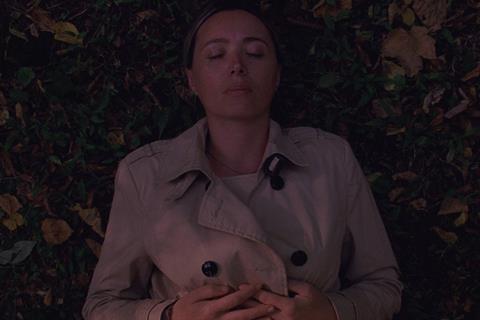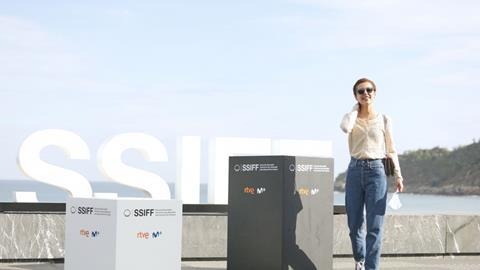Georgian writer/director Dea KulumbegashviliI discusses her debut feature Beginning, which triumphed at the recent San Sebastián Film Festival with four awards: best film, best director, best actress (for Ia Sukhitashvili) and best screenplay (for Kulumbegashvili and Rati Oneli).
Beginning tells the story of the traumatic journey of Yana, the wife of a Jehovah’s Witness community leader in a small Georgian town. The film, produced by David Zerat, Ilan Amouyal and Rati Oneli and executive produced by Mexico’s Carlos Reygadas, was chosen for the Cannes 2020 Label before screening at the Toronto, San Sebastián and New York film festivals. Next up is the Busan film festival.
Handled by Wild Bunch, Beginning is Georgia’s official submission for the 2020 best international feature Oscar race.
Beginning starts with a firebomb attack on a hall where a Jehovah’s Witness community is gathering. How important was it for you to address religion in the film?
Georgia is a very religious country. With the collapse of the Soviet Union in the 1990s, there was a huge mess, a civil war. It was my childhood. A time with an overwhelming sense of hopelessness and in these circumstances, people tend to replace one dream for another, so religion came to fill in for the Soviet ideals. Georgia became extremely religious, and so did I. I was seriously considering becoming a nun and devoting my life to God. I think underneath it all there was a search for spirituality but when I started going to university that changed.
I think the idea of tolerance is completely misunderstood. People think that it means to allow others to exist, but it’s more a matter of co-existing on equal terms. In Georgia, the Orthodox Christian church is so powerful and connected to the State that belonging to the Jehovah’s Witnesses or any kind of smaller congregation enhances the sense of alienation. Your personal choices, even if it’s your religion, suddenly make you a foreigner in the place where you grew up.
I don’t think religions are good or bad but we should stop labelling people in such a simplistic way and look at the human needs and wants that make us associate with a group, to find purpose.
Did Covid-19 impact the process of making the film at all?
The shooting wasn’t affected because principal photography started in September 2019 in Georgia, near the border with Azerbaijan. The pandemic hit when we were editing the film in Mexico City. Carlos Reygadas offered us the possibility to work in his studio [south of the capital, in the state of Morelos]. Carlos was there with his family but told us nobody else would be coming. We happily accepted and were able to self-isolate up there in the mountains while working on the post-production without interruptions. I was there with the editor, Matthieu Taponier, and also my cinematographer, Arseni Khachaturan.
How did Beginning begin as a project?
The original title of the project was Naked Sky but it corresponded to an earlier version of the script that was totally different despite exploring the same themes and the same character, Yana. People gave me a lot of feedback, comments and at some point, I felt I was losing touch with the film. I spoke to my producers and asked for some months of solitude to work on my own. I’m really grateful to them for trusting me and letting me be alone to rewrite everything. I needed to, because I was unable to work while listening to so many different opinions. I guess this happens to a lot of young filmmakers. It’s done with the best of intentions but in the end a filmmaker has to face his or her own battles and fail if you have to.

What was strange was that there were all these men giving me notes on the female character and how she needed to be more likeable. There were also a lot of conversations about the expectations for a woman director, like that the protagonist needed to be a more positive example, that she needed to be more empowered, that she needed to seek revenge. I think my protagonist is empowered but her empowerment is not a positive experience, on the contrary it’s a painful experience.
Do you think it is becoming easier for women to direct, to get films made?
I don’t have a broad perspective on the industry but I don’t have the feeling it has changed that much. You know what’s annoying? Some men telling me I have got into festivals because I’m a woman. It’s not because of your work, it’s because you are a woman.
How did you conceive the film formally, including a structure of long static takes shot in Academy ratio?
Even though I grew up in the town where we shot, I spent a lot of time working with my cinematographer Arseni scouting for locations. I wanted to feel the rhythm of life of people on the screen and be truthful to the perception of time and how it flows in this space. Arseni’s first instinct was to use dolly shots, a moving camera, but I couldn’t see it. I think everybody in the crew was quite scared when I said I wanted one lens and a static camera. But I thought that was exactly what I needed to tell the story of this woman.
Was there a drive to try something new, different?
Not really, more a matter of what I feel the film needed. I believe that as much as you influence your film, the film also influences you. You think you are in control but then things happen that you didn’t anticipate. That’s cinema, and you need to be open and listen to your film. The image of a director, the ego, the power, these things don’t interest me. There is more interesting stuff to do in life. I need to be honest with myself and focus on work.
Does that have to do with the quote on your WhatsApp: “We are not particularly talented; we just try hard”?
I got that from a t-shirt by an American designer. It’s a way of reminding myself that a bit of humour and not taking yourself too seriously wouldn’t harm this business. Hard work is essential, to wake up every day and you give yourself fully to what you think you can do. Making a film is a long process, if you don’t feel connected to the material, you are done. I woke up so happy every day working on Beginning. That’s what I want to keep on doing.


























No comments yet